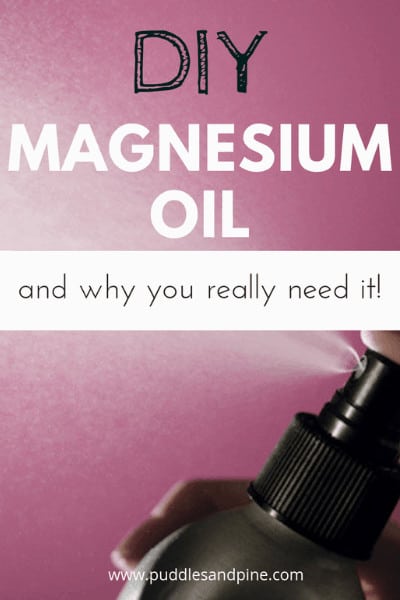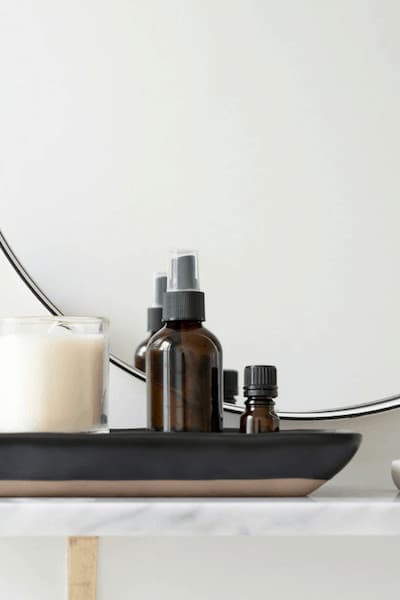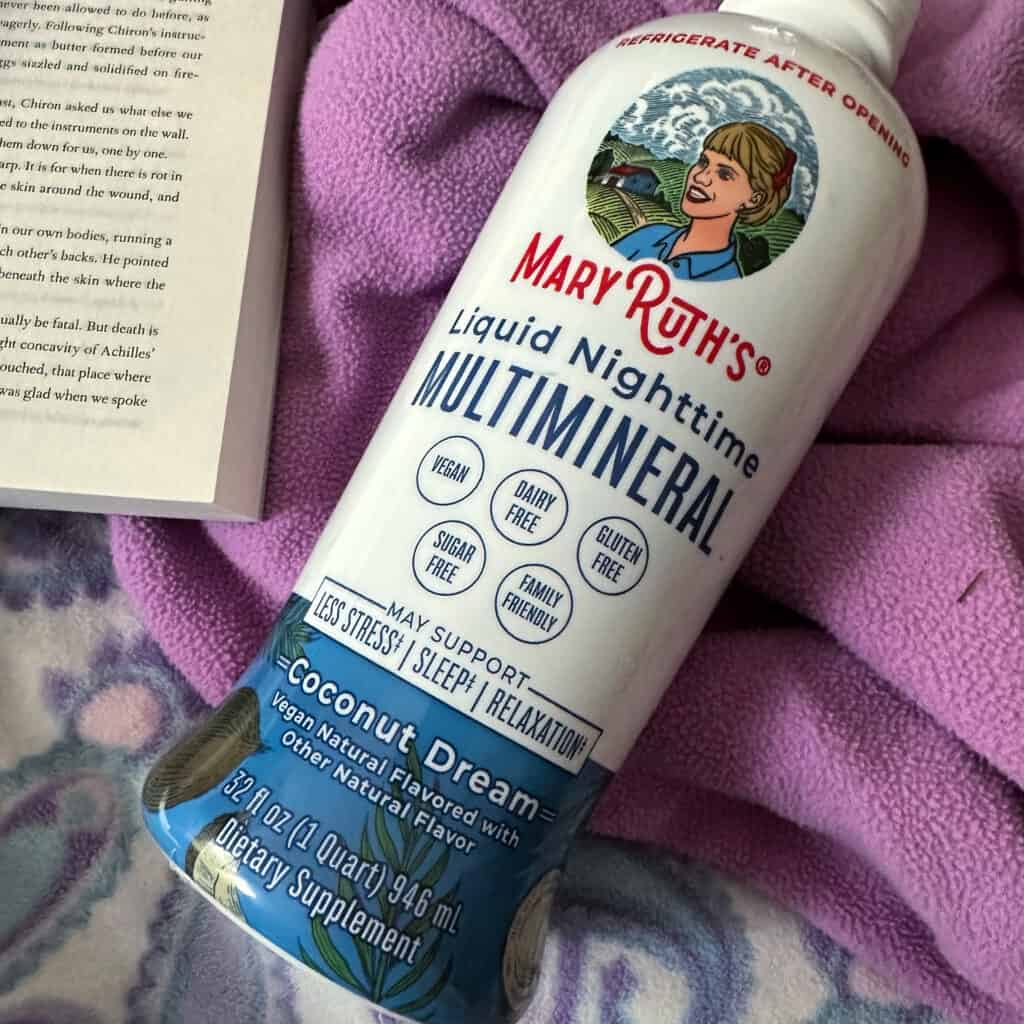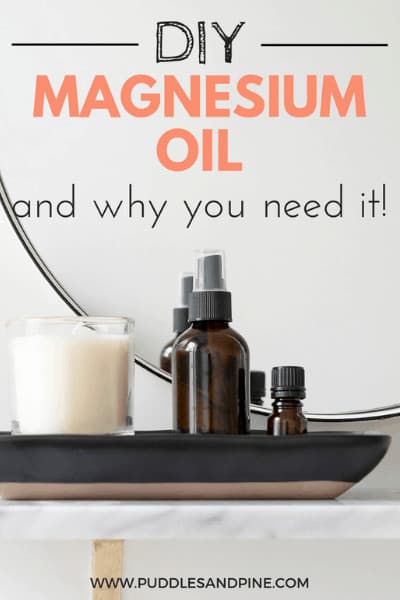How to make homemade natural magnesium oil and why you may need the many benefits of magnesium!
Magnesium plays a critical role in the body—it’s one of the 24 essential vitamins and minerals— and low magnesium levels can throw many of the body’s functions off balance.
There are so many benefits of magnesium, learn more about the amazing magnesium stress relief benefits, how to know if you need more magnesium and learn how to make homemade natural magnesium oil!
This post contains affiliate links.
What are the benefits of magnesium oil?
Healthy magnesium levels help stabilize your mood, relieve stress, promote better sleep, and contribute to heart and bone health.
In fact, magnesium can impact the body more significantly than most other vitamins or minerals.
Here are some of the many benefits of magnesium that are the most significant:
Better Sleep
People with low magnesium often experience restless sleep, which can mean waking frequently during the night and having a hard time falling back asleep.
They can also have a hard time falling asleep in the first place.
Magnesium helps to support deep sleep by maintaining healthy levels of GABA, a neurotransmitter that promotes sleep and it has also shown to be effective in fighting restless leg syndrome.
I can definitely attest to magnesium helping with better sleep and relief from restless leg syndrome. When I was pregnant with both my boys, I had the hardest time falling and staying asleep because of restless leg syndrome.
After discovering that magnesium supposedly helps with this I immediately tried magnesium oil, and that first night after using it, I was able to sleep better than I had in months. Mary Ruth Organics also offers a Nighttime Multivitamin, which works wonders as well as far as falling asleep and staying asleep!
Better sleep is definitely one of my favorite benefits of magnesium!

Stress Relief
Remember that GABA neurotransmitter? Well it encourages relaxation as well as sleep.
Low GABA levels in the body can make it difficult to relax, making magnesium a great option for stress reduction.
Magnesium deficiency is associated with heightened stress and anxiety and recent research indicates that magnesium deficiency can negatively affect gut health and is linked to anxiety issues and even mild to moderate depression.
Better Skin
Have you noticed that when you’re stressed, you tend to get acne breakouts on your face? This is because when you are extremely stressed, your body releases a hormone called cortisol which can cause the skin to get clogged with sebum, leading to acne.
You can read above why magnesium can help with stress relief which can significantly improve your skin.
Magnesium is also necessary for the enzymes that manage DNA cell repair and replication.
Without it, your skin becomes vulnerable to harmful free radical damage and inflammation that will ultimately lead to wrinkles and skin damage.
Magnesium also helps produce collagen!
Collagen is known widely for promoting skin elasticity which fight premature aging and wrinkles and gives skin a beautiful youthful glow.
Pain Relief
Research indicates that magnesium may help with pain associated with several different conditions such as:
- Sore muscles and back pain
- Pain as a result of fibromyalgia
- Headaches. Magnesium deficiency has been linked to headaches and migraines and supplemental magnesium has been shown to improve pain from both of these issues.
Balanced Blood Sugar
One of the important functions of magnesium is regulating blood sugar and metabolizing glucose in the body.
Those with balanced levels of magnesium are associated with lower risk for type 2 diabetes, while those with low magnesium levels are linked to higher blood sugar and insulin issues.
One study showed that in pre-diabetics who were magnesium deficient, supplemental magnesium reduced blood glucose levels.

Why Don’t We Have Enough Magnesium?
Our bodies don’t produce magnesium so the magnesium we need must come from outside sources.
You can get magnesium through your diet but that requires being aware of magnesium rich foods and getting a decent amount of them.
We can also deplete the magnesium in our bodies with excessive sugar and caffeine and high levels of stress.
Nearly half of adult men and women in the United States aren’t getting enough magnesium and women and older adults are at an even higher risk for a deficiency.
The best way to determine if you are magnesium deficient is to get tested by your doctor but some of the most common symptoms of low magnesium are:
- Sleeplessness
- Headaches or migraines
- Anxiety
- Muscle pain
- Digestive problems
- High blood pressure
- Hormone problems
- Low energy
How To Get More Magnesium
There are several ways to get magnesium, the most common one being diet.
Magnesium-rich foods include dark leafy greens, seeds and nuts, several fruits and veggies, legumes, dairy products, meat, and unprocessed whole grains.
Unfortunately, many people don’t eat a perfect diet of magnesium rich foods and studies have shown that some soil that produces a lot of our food don’t actually contain as much magnesium from pesticide use and over farming.
Thankfully we can get supplemental magnesium several different ways, the most popular being:
Supplements
There are several different types of supplements you can take to increase your magnesium levels.
One of the most well known and popular magnesium supplements is actually in powdered drink form, called Natural Calm. It contains magnesium citrate and, as the name implies, it has calming properties. It promotes mental and muscle relaxation, and reduces muscle cramping.
I have tried this and I really like it, I find that it works very well and it is actually pretty tasty, unlike some other powdered supplements out there.
If you prefer to take your supplements in pill form you can also try a magnesium supplement that utilizes magnesium glycinate for bone and cardiovascular health.
There is also Mary Ruth Organics Nighttime Multivitamin, which is packed with magnesium. I find it gives me a great night’s sleep and also helps boost my nutrient intake.

Magnesium oil/lotion
This is my personal favorite way to get magnesium because it’s super easy and uses magnesium chloride, which is more easily absorbed by your body.
Magnesium “oil” isn’t actually an oil, it just feels more slippery because it’s slightly more alkaline than water.
When you first start using it, you might feel a tingle on your skin but it is completely normal and goes away after a few minutes.
I have made my own magnesium oil (which you can find the recipe for below) and I have also bought it pre-made. I love and use both so it’s really just personal preference on which way you want to go.
My favorite store bought product is Ancient Minerals Magnesium Oil and I would keep it next to my bed so I wouldn’t forget to use it every night.
There is also an Ancient Minerals Magnesium Lotion version if you prefer a creamy consistency, but I have not personally tried it yet.
Magnesium baths
Magnesium baths utilize magnesium sulfate (also known as epsom salts) to help soothe sore muscles and detox your body.
Your body won’t absorb as much magnesium in the bath as you would using an oil or lotion but it is still a great way to relax and is perfect if you just want to get those benefits for sore muscles.
I like to use these Ancient Minerals magnesium bath flakes, which contain magnesium chloride, to add to my bath when I use this method.
Homemade Natural Magnesium Oil Recipe
If you want to make your own magnesium oil, this is the recipe I use and I love it. It’s super easy and it works extremely well. You’ll need:
1/2 cup magnesium chloride flakes
1/2 cup distilled water (make sure you use distilled water, since this will extend the shelf life)
Boil the distilled water and pour over the magnesium flakes in a glass bowl. Stir the mixture well until the magnesium flakes are dissolved and then let it cool completely. Once it is cooled you can pour the magnesium oil in a spray bottle.
To use, simply spray anywhere on your body (I usually just do arms and legs but sometimes I will also do a couple sprays on my chest or stomach). About 8 to 10 sprays will usually give you the average recommended dose but you will have to experiment with what works best for you.
Tip: You can also add about 10 drops of lavender or cedarwood oil to your magnesium oil for some added sleep benefits!
Related Articles:
How To Detox Your Armpits (To Help You Smell Better)
The Best All Natural Vitamins And Supplements
How To Have A Healthy Home And What Can Make It Unhealthy

How To Make Homemade Natural Magnesium Oil








Pingback: How To Detox Your Armpits (To Help You Smell Better!) -
Magnesium has helped me sleep better. For me, I have to take my magnesium supplement in the morning. If I take it before bed, it keeps me awake.
I really need to make some of this. I bet this would be great for me. I could use magnesium oil.
Such an enlightening guide! Your step-by-step instructions make creating homemade magnesium oil seem like a breeze. The emphasis on natural ingredients and benefits adds a personal touch. Thanks for sharing this wonderful DIY recipe for a healthier lifestyle!
It seems like it would be very beneficial to have some magnesium oil on hand!
magnesium supplements have certainly helped in our home with stress and sleep issues..
I’ve been wanting to try magnesium. And I didn’t know I can do this at home. Thanks for this!
I haven’t taken magnesium in a while. I’ll need to get some and take it. It helps with muscle cramps/spasms too supposedly.
Impressive guide on crafting homemade natural magnesium oil! Your step-by-step instructions are easy to follow, and your enthusiasm for natural solutions is evident. Thanks for sharing this DIY recipe, it’s a real game-changer. Looking forward to more of your wonderful DIY tips!
It never occurred to me to make oils like this at home. Probably something I will never do, but it was nice learning how to do it.
This post came right on time. I read a few days ago that people are more prone to become sick if they do not have enough magnesium in our bodies. Can’t wait to try this oil!
I’ve tried mangnesium oil before bed and I didn’t really notice a difference. Do you think I’m doing something wrong?
I’m going to try your recipe!
I take magnesium as a supplement pill, but I’m wondering if the oil will be better to help headaches/migraines? Thanks for this informative post!
I really need some of this just to ease general stress and anxiety. Magnesium may be of some assistance to us.
Magnesium is an essential nutrient! Thank you for the clear instructions. Im happy to make a homemade natural oil.
I heard magnesium has a lot of great benefits. Thank you for teaching us how to make our own homemade magnesium oil at home!
I might have missed this…but you said most of us don’t get enough magnesium in our diets, but than i didn’t see what foods we could be eating more of to get it in our diets….any tips?
I take magnesium regularly and have also noticed my sleep is sweet. I love the idea of an oil though – with a little lavender in it. I’m going to get the flakes and make this up. One question – have you tried it in your hair? What effect if any does it have?